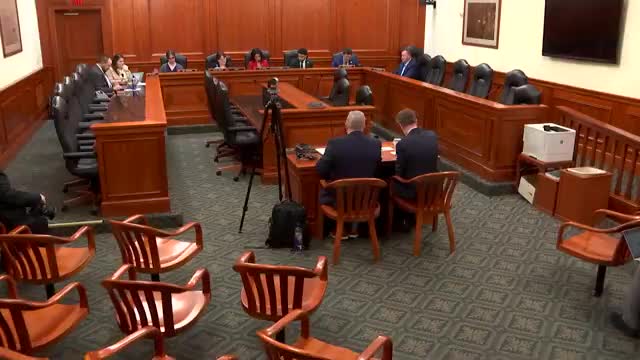Former Michigan attorneys general tell House panel office must prioritize law, public safety over politics
Get AI-powered insights, summaries, and transcripts
Subscribe
Summary
LANSING, Mich. — Former Michigan Attorneys General Bill Schuette and Mike Cox told a House Oversight Subcommittee on Weaponization of State Government that the attorney general's first responsibilities are public safety and enforcing the Michigan and U.S. constitutions, and warned that the office can be misused if politics drive charging and litigation decisions.
LANSING, Mich. — Former Michigan Attorneys General Bill Schuette and Mike Cox told a House Oversight Subcommittee on Weaponization of State Government that the attorney general's first responsibilities are public safety and enforcing the Michigan and U.S. constitutions, and warned that the office can be misused if politics drive charging and litigation decisions.
At a hearing convened by Chair Rep. Regas, the two Republicans described how the Michigan attorney general's office functions in practice, the institutional safeguards they say reduce partisan use of the office, and examples of cases that raise questions about proper priorities.
"The first responsibility of the attorney general is public safety," Bill Schuette said, adding that the office must "enforce the Michigan and United States Constitution." Mike Cox described the office as, in practice, "a house attorney for all state government," advising agencies and defending the state in civil matters while also initiating prosecutions and suits where appropriate.
Why it matters: The panel is examining whether and how the attorney general's powers can be used to pursue political opponents or policy goals rather than to protect the public and uphold the law. Lawmakers pressed the witnesses about high-profile matters including the Flint water prosecutions, the criminal charges against 16 alternate presidential electors, and when the state should bring or join suits against the federal government.
Schuette and Cox outlined several institutional and professional checks they said matter: the professional discretion of the elected attorney general, reliance on experienced staff and outside advisers, internal ethics officers and opinion-review processes, and the legal and ethical rules that govern prosecutors. Cox told the committee that an ethics officer and an opinion-review board were part of his internal safeguards but emphasized that, ultimately, "the buck stops with you" as the elected attorney general.
On suing the federal government, the witnesses said the office should act when a federal action directly affects Michigan interests. Cox cited litigation by the Great Lakes states and Ontario to block Asian carp as an example where state-led suits protected local economies and fisheries, and noted a subsequent federal appropriation that he said reflected the states' priorities. Both men also said there are instances when lawsuits are chiefly expressions of political disagreement rather than legal necessity, and said attorneys general should avoid that use of state resources.
The hearing also featured pointed questions about the Flint water prosecutions and the charging of 16 alternate presidential electors. Schuette and Cox defended the investigative practices of their offices during the Flint inquiry and said they took steps to ensure charges met legal elements; both criticized what they described as later prosecutorial decisions that, in their view, undermined accountability or politicized prosecutions. Cox specifically urged caution in public commentary about pending criminal matters, saying public statements that suggest prosecutors view defendants through a partisan lens can undercut confidence in fair administration of criminal justice.
Transparency and oversight were recurring themes. The witnesses said the Department of Attorney General is subject to Freedom of Information Act rules but acknowledged criminal matters have FOIA exemptions. Schuette said his administration posted bills online and cut staff by roughly 20% while in office; both men told lawmakers that appropriators and oversight committees have the right to ask detailed questions about spending, and that legislatures should use appropriation hearings to seek accountability without micromanaging active cases.
Committee members pressed for specifics in several areas. Rep. Shriver said his office FOIAed current AG Dana Nessel for records of prosecution spending on the false electors case and was told no records existed; Schuette and Cox said they tracked costs and billed work in their tenures. Rep. Bochovsky asked about a 2018 Michigan Department of Civil Rights interpretive statement and differing legal views conveyed by subsequent attorney general opinions; Schuette said he disagreed with the characterization that his office had threatened employees and offered to review cited minutes and news reports.
Both witnesses recommended attention to the quality of the attorney general's senior staff and outside advisers. Schuette emphasized building a deep bench of experienced trial and appellate lawyers and former judges, and Cox said he valued including nonpartisan prosecutors and career staff as a check against politicized decisions.
The subcommittee did not take votes. Chair Regas said the committee requested documents from Attorney General Nessel regarding Flint-related expenditures and will consider a subpoena if the records are not provided.
"You have to defend the whole constitution," Schuette said during his opening remarks. "And you can't pick and choose."
